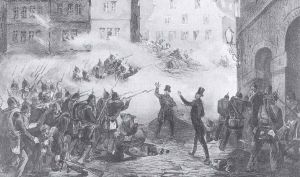Emigration
10
Military Conflicts
The Duchy of Saxe-Altenburg as many other european countries, experienced military conflicts directly affecting the population.
Thuringian Wars
The War of the Thuringian Succession (1247–1264), the Thuringian Counts’ War (1342-1346), and the Saxon Brothers War (1446-1451) were very destructive. The Saxon Brothers War destroyed a village between Fichtenhainichen, Gorma and Lehma. And even in 1900 there were stories among the inhabitants of Saxe-Altenburg about the consequences of this last war.
Information Source
Moritz Geyer. Osterlandsagen: Sagen, Bilder und Geschichten aus dem Altenburger Ostkreise (Osterland Tales: Tales, Photos and Stories from the Altenburger Ostkreise (eastern portion of Saxe-Altenburg Duchy)). A. Tittel, 1901. Downloaded from: https://books.google.com/books?id=mxcWAAAAYAAJ
Napoleonic Wars
The Napoleonic Wars (1803–1815) were a series of major conflicts pitting the French Empire and its allies, against a fluctuating array of European powers. Napoleon was defeated in 1815, 20 years before Julius Kirmse was born .
Information Source
Derived From Wikipedia: Napoleonic Wars.
German revolutions of 1848–49
Julius Kirmse was 13 years old when the German revolutions of 1848–49 began. These German revolutions were initially part of the Revolutions of 1848 that broke out in many European countries. They were a series of loosely coordinated protests and rebellions in the states of the German Confederation.

The middle-class elements were committed to liberal principles, while the working class sought radical improvements to their working and living conditions. As the middle class and working class components of the Revolution split, the conservative aristocracy defeated it.
Liberals were forced into exile to escape political persecution, where they became known as Forty-Eighters. From 1849 the German states saw a sharp rise in emigration as thousands deserted their homeland. Many emigrated to the United States.
Information Source
Derived From Wikpedia: German Revolutions of 1848
Military Training
Marching Drills
Many civilians and military men would like to consider discipline the primary role of drill. But many of those who go through this training do not consider the ordeal in such honorable terms.
Information Source
Vexen Crabtree. Military Drill: Its Theory and Purpose 2004. Downloaded 21 Jan 2019 from http://www.vexen.co.uk/military/drill.html
German Training
German soldiers are subjected to seven hours drill per day, in rain, snow, fog, or sunshine, and that in no country in the world is such close attention paid to the training of the individual soldier as in Germany …
As regards the method of training, the Captain is practically unfettered by regulations, and no one has a right to interfere with what he sees fit to do, unless his system is directly contrary to existing regulations or manifestly would give insufficient results.
Information Source
Hard-Worked Recruits – How the Germans School Their Soldiers. The New York Times Published: December 1, 1889
Brutal Beatings of Recruits
According to Helen (Kirmse) Hacker, Julius had seen the German army in training and how the commander called the soldiers a dirty dog and whiplashed the recruits when they didn’t march precisely in step. So Julius wanted to get away to America.
Information Source
Helen Hacker email sent to Dale Kirmse: Monday, May 26, 2003 12:08 PM
What to Do?
When Julius was approaching his 18th birthday, he feared that he would be subject to military draft.
According to Grandmother Kirmse, about this time Julius visited across the fence with a neighbor and a medical doctor who was returning to New York. Julius expressed his desire to leave Germany and go to America. The doctor offered Julius a job in New York and would pay for Julius’s travel provided Julius for one year would maintain the doctor’s horses and buggies and always have horse and buggy ready for immediate travel to a patient/case.
Julius agreed to the offer and as will be noted in the next chapter, three days before his 18th birthday Julius obtained permission to immigrate to the USA.
Information Source
Grandmother Kirmse stories about Julius immigrating to America.
The Irony
Julius avoided military duty in Germany. However, the irony is that the American Civil war broke out shortly after Julius arrived in the USA. In the summer of 1862, Julius enlisted as a private in the 64th Regiment of Enrolled Missouri Militia. He served until March 12, 1865.
Information Source
Julius Kirmse’s testimony.
